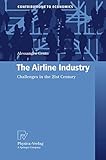The Airline Industry : Challenges in the 21st Century / by Alessandro Cento.
Tipo de material: TextoSeries Contributions to EconomicsEditor: Heidelberg : Physica-Verlag HD, 2009Descripción: recurso en líneaTipo de contenido:
TextoSeries Contributions to EconomicsEditor: Heidelberg : Physica-Verlag HD, 2009Descripción: recurso en líneaTipo de contenido: - texto
- computadora
- recurso en línea
- 9783790820881
- HB71-74
Springer eBooks
The Airline Industry in Perspective -- Characteristics of the Airline Industry -- Coping with Crises in the Airline Industry -- Short- and Long-Term Reaction to Exogenous Demand Shifts -- The Airlines Conduct during the Crises of 2001/2003 -- The Rise of Low-Cost Carriers -- Effects of LCC Entry on Pricing in Aviation -- Network Competition: the Coexistence of Hub-And-Spoke and Point-To-Point Systems -- New Measures to Compare Network Configurations of Full-Service and Low-Cost Carriers -- Conclusions -- Retrospect and Prospect.
The debate on the future of the aviation sector and the evolution of its traditional business practices is the core of this book. The new millennium began with terrorist attacks, epidemics, globalization, and the rise in oil prices which all combined to push the industry into a "perfect storm". Airline industry profitability has been an elusive goal for several decades and the recent events has only accentuated existing weaknesses. The main concern of industry observers is whether the airline business model, successful during the 1980s and 1990s, is now sustainable in a market crowded by low-cost carriers. The airlines that will respond rapidly and determinedly to increase pressure to restructure, consolidate and segment the industry will achieve competitive advantages. In this context, the present study aims to model the new conduct of the 'legacy' carriers in a new liberalized European market in terms of network and pricing competition with low-cost carriers and competitive reaction to the global economic crises.
Para consulta fuera de la UANL se requiere clave de acceso remoto.


